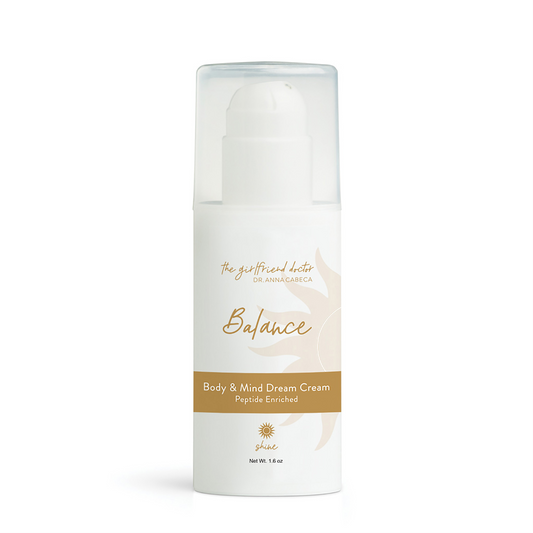Understanding Your Body's Most Powerful Partnership
The relationship between your gut and hormones is far more intricate than most women realize. As we navigate our 40s, 50s, and beyond, this connection becomes increasingly critical to our overall well-being, energy levels, and quality of life.
In This Article, You Will Learn:
• How gut bacteria directly influence hormone production and metabolism
• Why digestive issues often worsen during perimenopause and menopause
• Evidence-based strategies to restore gut-hormone balance naturally
• Which nutrients and supplements support both digestive and hormonal health
• Practical daily habits that optimize your gut microbiome for better hormone function

Your digestive system houses approximately 70% of your immune system and produces more neurotransmitters than your brain. But here's what's truly remarkable: your gut microbiome plays a crucial role in metabolizing and regulating hormones, particularly estrogen, progesterone, and cortisol.
The estrobolome—a collection of bacteria in your gut microbiome—is responsible for metabolizing estrogen. When this bacterial community is imbalanced, it can lead to estrogen dominance or deficiency, both of which create cascading effects throughout your body.
Research published in the Journal of Clinical Medicine (2023) demonstrates that women with diverse, healthy gut microbiomes experience fewer severe menopausal symptoms and maintain better hormonal balance throughout their transition years¹. The study followed 1,200 women aged 45-65 and found that those with optimal gut health reported 40% fewer hot flashes, better sleep quality, and improved mood stability.
How Gut Imbalance Disrupts Hormone Function
When your digestive system is compromised, several hormonal disruptions occur:
Estrogen Metabolism Dysfunction: An imbalanced gut microbiome can either increase or decrease estrogen levels inappropriately, leading to symptoms like irregular periods, mood swings, weight gain, and increased breast cancer risk.
Cortisol Dysregulation: Poor gut health triggers chronic inflammation, which elevates cortisol levels. Elevated cortisol suppresses other hormone production and contributes to belly weight gain, sleep disruption, and energy crashes.
Insulin Resistance: Gut inflammation affects insulin sensitivity, making it harder to maintain stable blood sugar levels and a healthy weight, particularly around the midsection.
Thyroid Interference: Since 20% of thyroid hormone conversion happens in the gut, digestive issues can lead to hypothyroid symptoms even when thyroid blood tests appear normal.

The relationship works both ways. As estrogen and progesterone levels fluctuate during perimenopause and menopause, digestive function changes dramatically:
Decreased Stomach Acid Production
Estrogen helps maintain adequate stomach acid levels. As estrogen declines, many women experience decreased hydrochloric acid production, leading to:
Bloating after meals
Feeling full quickly
Heartburn and acid reflux
Poor absorption of nutrients like B12, iron, and zinc
Slowed Gastric Motility
Lower progesterone levels affect the smooth muscle contractions that move food through your digestive tract. This can result in:
Chronic constipation
Increased bloating
Small intestinal bacterial overgrowth (SIBO)
Food sensitivities that didn't exist before
Changes in Gut Barrier Function
Hormonal fluctuations can increase intestinal permeability (often called "leaky gut"), allowing toxins and undigested food particles to enter your bloodstream, triggering inflammation and immune reactions.

Perhaps the most significant aspect of the gut-hormone connection is chronic inflammation. When your digestive system is inflamed, it sends stress signals throughout your body, elevating cortisol and disrupting the delicate balance of other hormones.
This inflammatory cascade can manifest as:
Persistent fatigue that doesn't improve with rest
Unexplained weight gain, especially around the waist
Brain fog and difficulty concentrating
Joint pain and stiffness
Skin issues like acne, eczema, or premature aging
Mood changes, including anxiety and depression
Supporting Your Gut-Hormone Balance Naturally
The good news is that targeted nutrition and lifestyle strategies can significantly improve both digestive and hormonal health. Here's how to support your body's natural balance:
1. Prioritize Prebiotic-Rich Foods
Prebiotics feed beneficial gut bacteria, helping them flourish and support hormone metabolism. Focus on:
Jerusalem artichokes
Garlic and onions
Asparagus
Green bananas
Chicory root
Dandelion greens
2. Include Fermented Foods Daily
Fermented foods provide beneficial probiotics that directly support the estrobolome:
Kefir (dairy or coconut-based)
Sauerkraut and kimchi
Miso and tempeh
Kombucha (low-sugar varieties)
Fermented vegetables
3. Support Digestive Function
As stomach acid production naturally decreases with age, supporting digestion becomes crucial:
Begin meals with a small serving of fermented vegetables
Consider digestive enzymes with meals
Practice mindful eating and thorough chewing
Avoid drinking large amounts of liquid with meals
4. Manage Stress Strategically
Since chronic stress disrupts both gut health and hormone balance, stress management isn't optional:
Implement a consistent sleep schedule
Practice deep breathing or meditation
Engage in regular, moderate exercise
Maintain social connections and community

While a foundation of whole foods nutrition is essential, certain supplements can provide additional support for the complex gut-hormone relationship.
Comprehensive Digestive Support: "Gut Thrive" combines probiotics, prebiotics, and digestive enzymes in one formula designed to support optimal digestive function. This comprehensive approach addresses multiple aspects of gut health simultaneously, from promoting beneficial bacteria growth to supporting proper nutrient absorption.
Hormonal Balance Support: "Mighty Maca Plus" provides adaptogenic herbs and nutrients that support the adrenal glands and help balance cortisol levels. The maca root in this formula has been traditionally used to support hormonal balance during perimenopause and menopause, while the additional superfoods provide antioxidant support for overall cellular health.
Essential Mineral Support: "AmaZinc" delivers bioavailable zinc, which is crucial for both digestive enzyme production and hormone synthesis. Zinc deficiency is common in women over 40 and can contribute to both digestive issues and hormonal imbalances.
These targeted supplements work synergistically with a nutrient-dense diet to support your body's natural healing processes.

When to Seek Professional Support
While natural approaches are powerful, certain symptoms warrant professional evaluation:
Persistent digestive symptoms that don't improve with dietary changes
Severe hormonal symptoms that interfere with daily life
Unexplained weight gain or difficulty losing weight
Chronic fatigue that doesn't respond to lifestyle improvements
Mood changes that feel overwhelming or unmanageable
A healthcare provider can help identify underlying issues like SIBO, food sensitivities, or hormonal imbalances that may require specific treatment approaches.
The Long-Term Vision: Thriving Beyond 40
Supporting your gut-hormone connection isn't about quick fixes—it's about creating sustainable health practices that serve you for decades to come. Women who prioritize both digestive and hormonal health report:
Sustained energy throughout the day
Better mood stability and resilience
Easier weight management
Improved sleep quality
Enhanced immunity and faster recovery
Greater confidence in their body's ability to heal and thrive
The research is clear: the gut-hormone connection profoundly impacts every aspect of women's health after 40. By understanding this relationship and implementing targeted support strategies, you can navigate this life stage with vitality, confidence, and optimal wellness.
Remember, your body has an incredible capacity for healing and restoration. With the right support, consistency, and patience, you can optimize both your digestive health and hormonal balance for vibrant health in your 40s, 50s, and beyond.

Q: How long does it take to see improvements in gut-hormone balance?
A: Most women notice initial improvements in energy and digestion within 2-4 weeks of implementing consistent changes. Hormonal balance improvements typically become apparent within 2-3 months, as it takes time for the gut microbiome to rebalance and for hormone levels to stabilize.
Q: Can gut health supplements interfere with hormone replacement therapy?
A: Quality gut health supplements are generally safe to use alongside HRT, but it's important to consult with your healthcare provider before adding new supplements to ensure there are no interactions with your specific medications or health conditions.
Q: What are the most common signs that my gut health is affecting my hormones?
A: Key indicators include persistent bloating, irregular periods or worsening menopausal symptoms, unexplained weight gain (especially around the midsection), mood swings that seem tied to digestive issues, and skin problems that coincide with digestive symptoms.
Q: Is it normal for digestive issues to worsen during perimenopause?
A: Yes, it's very common for digestive function to change during hormonal transitions. The decrease in estrogen and progesterone directly affects stomach acid production, gut motility, and the gut barrier function. Understanding this connection helps you take proactive steps to support both systems during this transition.
References:
¹ Chen, L., et al. (2023). "Gut microbiome diversity and menopausal symptom severity: A longitudinal study." Journal of Clinical Medicine, 12(8), 2847.
Disclaimer: This information is for educational purposes only and is not intended to diagnose, treat, cure, or prevent any disease. Always consult your healthcare provider.







